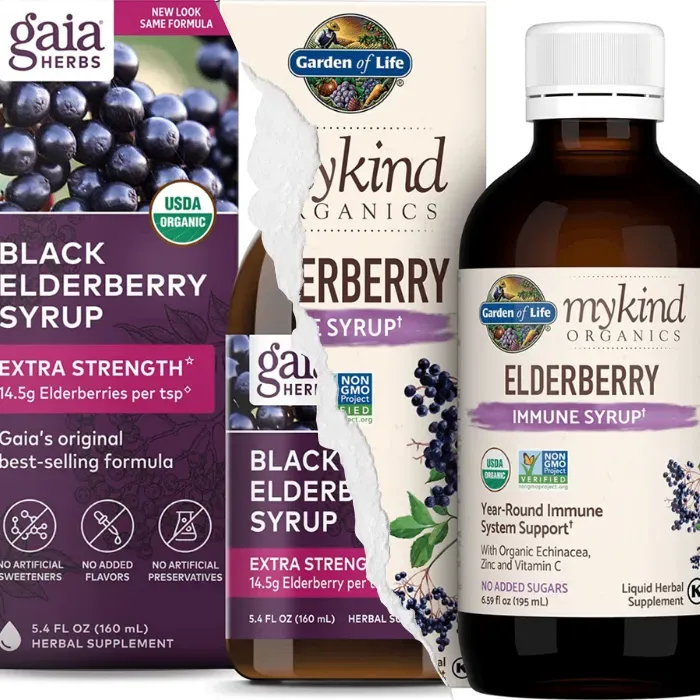Table of Contents
Berry season is a special time. Not only do these fruits and vegetables taste great, but they’re also packed with some great nutrients that are good for your health.
This article takes a closer look at the health benefits of elderberry which has long been used as a natural remedy for a variety of ailments.
If you're like most people, you probably think of elderberry as a plant that grows in the wild and is used to make jams only. But you will be surprised to know that this small black-purple berry has some amazing health benefits that most of us are unaware of.
Check out this post to learn more about the health benefits of elderberry, and find out how you can add it to your diet.
What is Elderberry?
The term "elderberry" is used to describe a number of different species of the Sambucus tree which is a member of the Adoxaceae family.
The most prevalent of these species is the Sambucus nigra, usually referred to as the European elderberry or black elder. It can grow up to 30 feet in height. Although it is commonly grown throughout the rest of the world, this tree is native to Europe.
The tree produces clusters of tiny white or cream-colored flowers called the elderflowers and the berries grow in tiny blue- or black-colored clusters.
Because they are so tart, the berries must be cooked before eating. While the flowers can be consumed raw or cooked and have a delicate muscat aroma.
The American elder, dwarf elder, blue elderberry, danewort, red-fruited elder, and antelope brush are further variants of the Sambucus tree. So, don't mistake elderberry for them, as most people do!
Gummies and supplements frequently contain elderberry as an active component. They are likely to affect your immune system and are potent against virus infections. The typical cold or flu, excessive cholesterol, and many other illnesses are treated with elderberries and their supplements frequently.
History of The Plant
Elderberry or Sambucus nigra has been one of the most widely used medicinal herbs in the world. Throughout history, various elderberry tree parts have been utilized for both culinary and medical uses.
The plant may have been dropped by the retreating Ice Age, 12,000 to 9,000 B.C.E., on the continents of modern Europe, Asia, and North America.
Ancient Egyptians used it to whiten their skin and heal burns, while Indigenous people used it to treat fever and rheumatism. The leaves and petals have been used to relieve edema, inflammation, and pain, increase urine production, and cause sweating. The bark was used to cause vomiting, as a laxative, and as a diuretic.
In many regions of Europe, it is still collected and utilized in traditional medicine. The dried berries or juice are used to treat sciatica, headaches, dental pain, heart pain, and nerve pain in folk medicine.
Elderberry is now primarily consumed as a supplement to relieve cold or flu symptoms. However, it is also known that the plant's bark and leaves and raw elderberries are poisonous and can upset the stomach if consumed a lot. So cooking is required.
Additionally, the berries can be cooked and used to make juice, jams, chutneys, pies, and elderberry wine. The flowers are often boiled with sugar to make a sweet syrup or infused into the tea.
Nutritional Value
The following chart shows the nutritional value of a one-cup serving of elderberries;
Calories - 106 kcal
Fats - 1g
Protein - 1g
Carbohydrates - 27g
Dietary Fiber - 10g
Considering the recommended daily allowance of vitamins and minerals, one cup of elderberries offers the following;
Vitamin C - 52.2 mg
Vitamin A - 870 mg
Iron - 2.32 mg
Potassium - 406 mg
Calcium - 55mg
It must be noted that these values can vary depending on the variety of the plant, the ripeness of the berries, and climatic conditions.

The Health Benefits of Elderberry
Elderberries are low-calorie food densely packed with a variety of essential nutrients including vitamins and minerals. What is even more interesting is that they have high antioxidant content and include a significant amount of anthocyanins, phenolic acids, and flavonols.
This wonderful composition makes elderberries effective against a variety of health conditions and ensures benefits like UV protection, antibacterial effects, immune support, and diuretic effects.
Some of the preliminary studies support elderberries with respect to their medicinal potential. However, there is still limited evidence available and further research is much needed.
Let’s dive into the details of the elderberry health benefits!
Works well for cold and flu symptoms
It has been demonstrated that black elderberries' extracts and flower infusions can lessen the intensity and duration of influenza or cold and flu.
Elderberry is a commercially available remedy to treat colds. It is available in liquid, capsules, lozenge, and gummy forms.
In a study conducted in 2004 on 60 influenza patients, those who took 15 mL of elderberry syrup four times a day experienced symptom improvement in 2–4 days compared to 7–8 days for the control group.
In addition, a study of 312 air travelers who took capsules containing 300 mg of elderberry extract three times a day discovered that those who were ill had fewer severe cold and flu symptoms and shorter cold duration.
However, these studies have been in their initial stages and can’t be fully trusted for the results. Large-scale studies are thus required for confirmation!
Improves symptoms of chronic diseases
Reactive chemicals that can build up in the body may be discharged during regular metabolism. Oxidative stress brought on by this may result in conditions like type 2 diabetes and cancer.
Some vitamins, phenolic acids, and flavonoids are examples of natural antioxidants that can assist in removing these reactive compounds. Thus, an antioxidant-rich diet is often recommended by many health experts to help avoid chronic illnesses.
You’ll be glad to know that antioxidants are abundant in the flowers, fruits, and leaves of the elderberry plant. One of the anthocyanins present in berries, for instance, has 3.5 times the antioxidant capacity of vitamin E.
Therefore, elderberry had demonstrated encouraging outcomes in the laboratory, with respect to improving the symptoms of some chronic diseases. All hail its antioxidant properties!
Improves heart health
A healthy heart is a tremendous health benefit offered by the European elder. Research says that some health-related bio-indicators of the heart and blood vessels may be improved by elderberry consumption.
According to studies, elderberry juice may lower cholesterol and the amount of fat in the blood. A diet rich in flavonoids, such as anthocyanins, has also been shown to lower the risk of heart disease.
However, the cholesterol levels of 34 participants in one trial who received 400 mg of elderberry extract (equal to 4 mL of juice) three times per day for two weeks did not significantly decrease.
However, another trial on animals with elevated cholesterol showed that Black elderberry was found to reduce cholesterol levels in the liver and aorta but not in the blood.
Elderberries are also linked with reduced levels of blood uric acid which otherwise causes high blood pressure and poor heart health.
Provides Immune Support
Being rich in antioxidants and polyphenols, elderberries have often been praised for their immunity-boosting capabilities.
Some preliminary studies found elderberries effective enough to elevate the number of white blood cells in rats. It must be noted that white blood cells are the most eminent weapon of the immune system against foreign invaders and germs.
Also, elderberries are found to inhibit the growth of bacteria causing sinusitis and bronchitis.
Laboratory tests have also found elderberry extract to have a sun protection factor which makes it viable to protect skin against harmful radiations.
It must be noted that all these results need to be confirmed by large-scale research studies which are already in process!
Are There Any Disadvantages of Eating Elderberries?
Even though it has some attractive potential advantages, eating elderberry carries some risks too.
Small levels of lectin-containing compounds are present in the bark, unripe berries, and seeds. These molecules might upset your stomach if consumed in large quantities.
In addition, the elderberry plant has compounds called cyanogenic glycosides that, under certain conditions, can release cyanide. This poison is also present in almonds and apricot seeds. However, there are no records of fatalities from eating cooked berries or commercial preparations because they do not contain cyanide.
Nausea, vomiting, and diarrhea are reactions to consuming elderberry berries, leaves, bark, or roots that have not been cooked properly.
The Safest Form to Consume Elderberries
Elderberries have been grown for food and to create natural remedies for a very long time.
Elderberry products come in a variety of formats, including elderberry syrup, teas, dietary supplements, gummies, tonics (including oral elderberry extract), tinctures, and topical ointments. The tart ripe berry is usually sweetened (like cranberries) in the case of capsules and supplements.
It is always safe to use elderberries in these forms as raw or uncooked berries have potential health risks as stated above.
Other Related Articles

Conclusion
Elderberry is a fruit that has been used for a long time in traditional medicine and has some amazing therapeutic advantages. These include battling the flu and the common cold, easing discomfort, and perhaps even preventing some chronic diseases.
In order to avail of all these medicinal benefits, it is necessary to ensure adequate dietary elderberry supplementation. To serve the purpose, you have elderberry supplements as the safest option! They come in a variety of formats, such as candies, syrups, teas, and pills. You can consume them as per the suggested dose. It is always good practice to speak to a trusted healthcare practitioner before making major changes in your lifestyle.
Note, that black elderberries that aren't ripe should never be consumed because they can make you sick. And berries that are ripe should always be cooked before eating.







